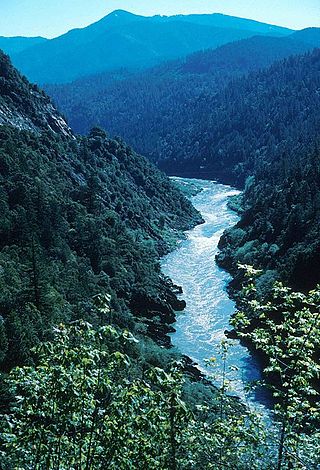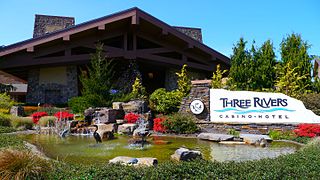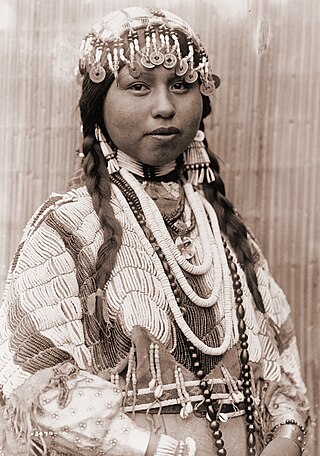
Native American gaming comprises casinos, bingo halls, slots halls and other gambling operations on Indian reservations or other tribal lands in the United States. Because these areas have tribal sovereignty, states have limited ability to forbid gambling there, as codified by the Indian Gaming Regulatory Act of 1988. As of 2011, there were 460 gambling operations run by 240 tribes, with a total annual revenue of $27 billion.

Chiloquin is a city in Klamath County, Oregon, United States. Chiloquin was the pioneer version of a Klamath family name Chaloquin, which was the name of a Klamath chief who was alive at the time of the treaty of 1864. Southern Pacific records also show that a woman named Bessie Chiloquin deeded a right-of-way through the area to the railroad on February 14, 1914. The population was 734 at the 2010 census.

The Warm Springs Indian Reservation consists of 1,019 square miles (2,640 km2) in north-central Oregon, in the United States, and is governed by the Confederated Tribes of Warm Springs.

The Klamath River flows 257 miles (414 km) through Oregon and northern California in the United States, emptying into the Pacific Ocean. By average discharge, the Klamath is the second largest river in California after the Sacramento River. Its nearly 16,000-square-mile (41,000 km2) watershed stretches from the high desert of south-central Oregon to the temperate rainforest of the North Coast. Unlike most rivers, the Klamath begins in a desert region and flows through the rugged Cascade Range and Klamath Mountains before reaching the ocean; National Geographic magazine has called the Klamath "a river upside down".

The Confederated Tribes of the Grand Ronde Community of Oregon (CTGR) is a federally recognized tribe of Indigenous peoples of the Northwest Plateau. They consist of at least 27 Native American tribes with long historical ties to present-day western Oregon between the western boundary of the Oregon Coast and the eastern boundary of the Cascade Range, and the northern boundary of southwestern Washington and the southern boundary of northern California.
The Lytton Band of Pomo Indians is a federally recognized tribe of Pomo Native Americans. They were recognized in the late 1980s, as lineal descendants of the two families who lived at the Lytton Rancheria in Healdsburg, California from 1937 to about 1960. The tribe now has around 275 enrolled members. It has a casino in San Pablo, California, and has proposed to build housing for tribe members, plus a winery and a hotel, just west of Windsor, California, in Sonoma County.

In the United States, gambling is subject to a variety of legal restrictions. In 2008, gambling activities generated gross revenues of $92.27 billion in the United States.
The Klamath Tribes, formerly the Klamath Indian Tribe of Oregon, are a federally recognized Native American Nation consisting of three Native American tribes who traditionally inhabited Southern Oregon and Northern California in the United States: the Klamath, Modoc, and Yahooskin. The tribal government is based in Chiloquin, Oregon.
Klamath, also Klamath–Modoc and historically Lutuamian, is a Native American language spoken around Klamath Lake in what is now southern Oregon and northern California. It is the traditional language of the Klamath and Modoc peoples, each of whom spoke a dialect of the language. By 1998, only one native speaker remained, and by 2003, this last fluent Klamath speaker who was living in Chiloquin, Oregon, was 92 years old. As of 2006 there were no fluent native speakers of either the Klamath or Modoc dialects; however, as of 2019, revitalization efforts are underway with the goal of creating new speakers.
In the first decade of the 2000s, the Confederated Tribes of Warm Springs sought to build a casino in the Columbia River Gorge. They ended their pursuit of the project in 2013. They considered various sites, as early as 1999; the most extensive plan called for a 60-acre (24 ha) facility with 250 hotel rooms in Cascade Locks, Oregon. The proposed site is within the Columbia River Gorge National Scenic Area, and adjacent to a federally designated wilderness area, but within the city limits of Cascade Locks..

Gambling in Oregon relates to the laws, regulations, and authorized forms of gambling.
Gambling in Pennsylvania includes casino gambling, the Pennsylvania Lottery, horse racing, bingo, and small games of chance conducted by nonprofit organizations and taverns under limited circumstances. Although casino gaming has been legal for less than two decades, Pennsylvania is second only to Nevada in commercial casino revenues.

The Old Camp Casino was a tribal casino near Burns, Oregon, United States, owned and operated by the Burns Paiute Tribe.

The Native American peoples of Oregon are the set of Indigenous peoples who have inhabited or who still inhabit the area delineated in today's state of Oregon in the Pacific Northwest region of the United States. While the state of Oregon currently maintains relations with nine federally recognized tribal groups, the state was previously home to a much larger number of autonomous tribal groups, which today either no longer exist or have been absorbed into these larger confederated entities. Six of the nine tribes gained federal recognition in the late 20th century, after undergoing the termination and restoration of their treaty rights starting in the 1950s.
Legal forms of gambling in the U.S. state of North Carolina include the North Carolina Education Lottery, three Indian casinos, charitable bingo and raffles, and low-stakes "beach bingo". North Carolina has long resisted expansion of gambling, owing to its conservative Bible Belt culture.
Legal forms of gambling in the U.S. state of Texas include the Texas Lottery; parimutuel wagering on horse and greyhound racing; charitable bingo and raffles; and three Native American casinos. Other forms of gambling are illegal in Texas.
Legal forms of gambling in the U.S. state of Massachusetts include casinos, sports betting, parimutuel wagering on horse racing, the Massachusetts Lottery, and charitable gaming. The Massachusetts Gaming Commission regulates commercial operations under state jurisdiction.

The ilani Casino Resort is a casino operated by the Cowlitz Indian Tribe and located near La Center, Washington. The casino opened on April 24, 2017, after a lengthy legal battle over the tribe's right to establish a reservation on which to build the casino.

Angel of the Winds Casino Resort is a casino and hotel operated by the Stillaguamish Tribe of Indians near Arlington, Washington, United States. The casino opened in 2004 east of Interstate 5 and was initially in a modular building until an expansion in 2008. A 125-room hotel opened at the site in 2015 alongside additional gaming space.











